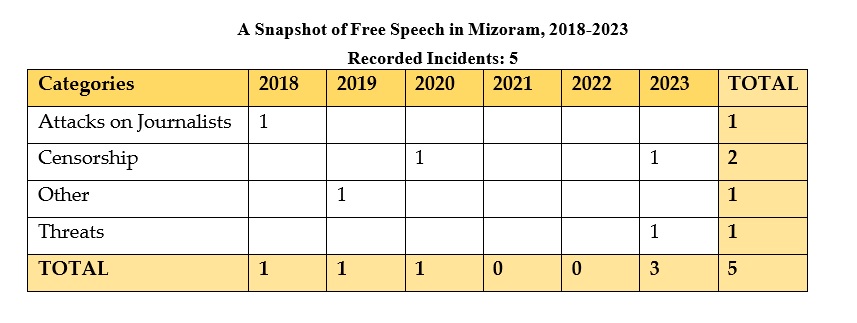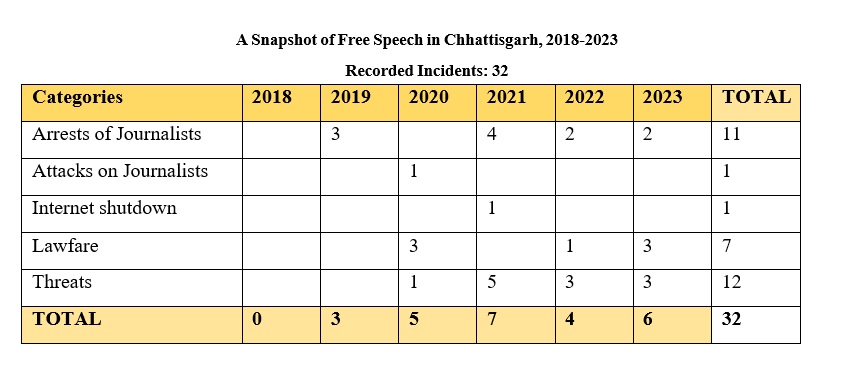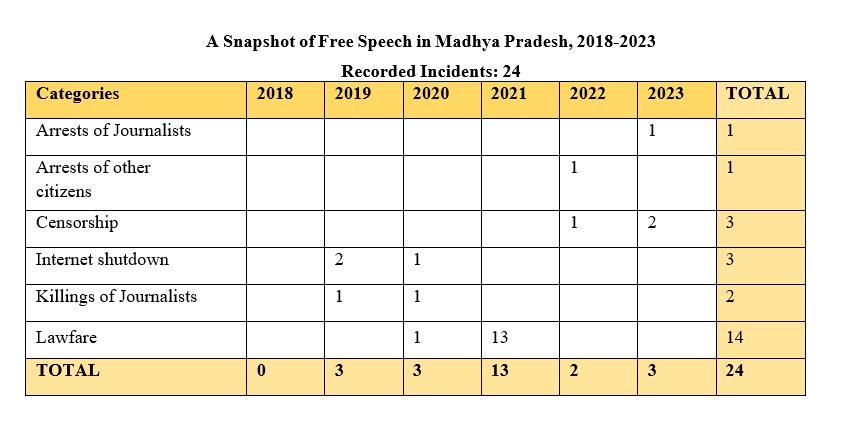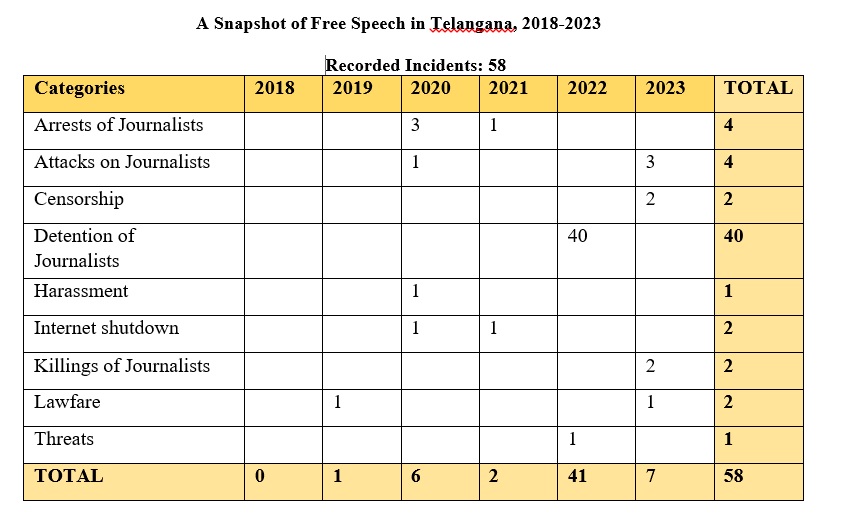Over the last five years, that is between 2018-2023, data examined by the Free Speech Collective, reveals a manifold attack on media and practising journalists in all five states that face an assembly election. The “scourge of ‘lawfare’ has resulted in in the arrest of 11 journalists, some of them more than once and the lodging of cases against seven journalists others. At least 12 journalists have faced intimidation and threats of cases being registered against them in the five states going to the polls from tomorrow, November 7.In these five states, there were two killings of journalists and RTI activists (Chakresh Jain and Sunil Tiwari in Madhya Pradesh; Mamidi Karunakar Reddy and Nalla Ramakrishnaiah in Telangana;) while at least four journalists were arrested and three were attacked. Two RTI activists, Jagdish Goliya and Rai Singh Gurjar were killed in this period in Rajasthan.
Between 2018-2023, that is the term of the incumbent governments facing elections, journalists and RTI activists in these states have been killed, arrested and attacked for their work. Censorship was an abiding feature, either due to government policy or through the weapon of ‘lawfare’, as journalists were slapped with cases ranging from sedition to defamation, causing disharmony and enmity, often struggling with multiple FIRs registered in different police stations.
Of the five state assemblies go to the polls – Chhattisgarh, in two phases, on November 7 and 17; Mizoram on November 7; Madhya Pradesh on November 17; Rajasthan on November 23 and Telangana on November 30. Among the issues being raised before the electorate – social security schemes, health insurance, protection for gig workers, unemployment, corruption, health care, safety of women, displacement due to infrastructure projects, farm loans and pensions, there is a studied silence over the state of free speech and safety of media persons in these states.
The categories recorded by Free Speech Collective were: Killings of journalists; arrests; detentions; deportation; arrest of other citizens; attacks on journalists; threats; censorship, Internet shutdowns, cases of defamation, sedition and contempt of court, clubbed uner the term ‘lawfare’ to indicate overuse and misuse of laws to silence dissent). The report records cases, police investigations and action and court cases and judgements in this period. It includes news reports, monitoring of existing cases, interviews with key stakeholders along with a brief contextual background into each state and a brief summary of laws affecting freedom of expression.
Mizoram (goes to the polls on November 7):
Over the last five years, one journalist was attacked, another was threatened and two faced censorship. According to local journalists who sought anonymity, self-censorship had become a norm and divisions on political lines within the media has also not helped the cause of press freedom.
In Mizoram, access to information has been the biggest challenge and journalists’ bodies have been hampered by attempts by the government and border security forces to restrict their movements and regulate permission for news coverage in border areas. Mizoram, which goes to the polls on November 7, shares a border with Manipur and its government has come out in support of the Kuki-Zo community in the wake of the ongoing conflict in Manipur. Its government has stated that it will ignore the Union home ministry’s order to collect biometric data of refugees from bordering Myanmar who have crossed the international border to flee from the junta. Chhattisgarh (goes to the polls in two phases on November 7 and 17):
Chhattisgarh (goes to the polls in two phases on November 7 and 17):
The Free Speech report observes that while Chhattisgarh was one of the few states which offered financial assistance of Rs 500,000 to dependents of media persons who died due to Covid-19 under the Media Representative Welfare Assistance Rules, journalists in this state faced the brunt of ‘lawfare’, being charged under multiple sections of the law for reporting on sand mining and other corruption at local levels.
Despite government assurances and the passage of a media protection law, journalists on the ground were vulnerable to false cases. In Surguja division alone, which comprises six districts, 22 journalists have faced the brunt for their reporting, most of whom have been arrested or have had cases slapped against them. arrested. Take the case of Sunil Namdev, who runs a YouTube channel News Today. Reporting on Covid violations by the ruling party members; corruption in construction; the arrest of senior IAS officers who colluded with the Congress government in the coal mafia scam, promptly landed him in jail, where he still is lodged since May 2023. Jitendra Jaiswal, a journalist from Ambikapur who runs a digital news platform, Bharat Samman has 12 cases against him – one during the 15-year- old BJP rule and the rest in the last five years of Congress rule. Jaiswal has recently been given a notice of ‘jilla badal’ (externment) placing him under the list of ‘gunda-badmash’ (gangster). Madhya Pradesh (goes to the polls of November 17):
Madhya Pradesh (goes to the polls of November 17):
Over the last five years, there were 24 incidents of free speech violations recorded in Madhya Pradesh. Apart from the killing of two journalists (Chakresh Jain and Sunil Tiwari), the arrests of journalists, stand-up comedian Munawar Faruqui and five members of his team, there were 12 instances of “lawfare” against the media. Madhya Pradesh also became a laboratory of sorts for academic censorship with the monitoring of prescribed books, classroom teaching and the targeting of teachers of a minority community, as exemplified but the case against Dr Farhat Khan in Indore.
As the recent arrest and over two-month long incarceration of reporter Jaalam Singh, charged with seven FIRs in Guna and Shivpuri districts in Madhya Pradesh indicates, such repressive action has had a chilling effect on journalism. If on the one hand, there is acute self-censorship, on the other, there is a woeful absence of the critical questioning that would otherwise be the hallmark of investigative journalism. In both scenarios, the net result is deliberate silencing. As Suman Kirar, Jaalam Singh’s wife said bitterly, “Instead of questioning and protesting the arrest of a colleague, all these ‘positive’ stories are being published. A journalist who refused to take money or remain silent is still in jail.” Rajasthan (goes to the polls on November 23):
Rajasthan (goes to the polls on November 23):
Over the last five years, as per data available with Free Speech Collective, there were two killings of RTI activists (Jagdish Goliya and Rai Singh Gurjar) while six others were attacked. Of the total of 72 incidents of free speech violations, sixty were of internet shutdowns – amongst the largest in the country.
Rajasthan has also unfortunately used the undemocratic internet shutdown at times of law and order crises. Shutdowns were implemented ignoring the guidelines laid down by the Supreme Court of India in the Anuradha Bhasin case. In this western Indian state alone, Rajasthan, of the five states under review, the Internet was shut down on a whopping 72 occasions recorded by the FSC State Index, a majority of which were to clamp down on protests. Telangana (goes to polls on November 30):
Telangana (goes to polls on November 30):
There were two killings of journalists and RTI activists, while at least four journalists were arrested and three were attacked. In January 2022, in a shocking incident that amounts to mass intimidation of the media, around 40 journalists were detained for 12 hours for their allegedly unfavourable coverage of the Telangana Rashtra Samithi government and chief minister K. Chandrashekar Rao. In Telangana, bulldozer policing was used to devastating effect on May 22, 2020 to raze to the ground the residence of V6 News Channel journalist Shanigarapu Parameshwar, who reported on the birthday party of MLA Mahareddy Bhupal Reddy with 500 supporters in violation of the lockdown in Narayankhed, Telangana, observes the report.
Right to Information (RTI) activists also faced curbs on the right to free speech, and were vulnerable to murderous attacks. In a chilling case against an RTI activist and retired Mandal Parishad Development Officer (MPDO) in Telangana, 70-year-old RTI activist Nalla Ramakrishnaiah was killed in Jangaon district and his body dumped in a water-filled quarry after he complained about irregularities by the accused, G Anjaiah, in a land issue.
 This report has been prepared by Geeta Seshu, Laxmi Murthy, Malini Subramaniam and Sarita Ramamoorthy. The report has also observed that the term of the outgoing state assemblies was also marked by the Covid-19 pandemic and shutdown from March 24, 2020. There is already extensive documentation on the restrictions on the media during the unprecedented nation-wide lockdown. In Madhya Pradesh, the scare over the virus resulted in suspension of print media publications in 95 per cent of the state’s districts.
This report has been prepared by Geeta Seshu, Laxmi Murthy, Malini Subramaniam and Sarita Ramamoorthy. The report has also observed that the term of the outgoing state assemblies was also marked by the Covid-19 pandemic and shutdown from March 24, 2020. There is already extensive documentation on the restrictions on the media during the unprecedented nation-wide lockdown. In Madhya Pradesh, the scare over the virus resulted in suspension of print media publications in 95 per cent of the state’s districts.
Overall, observes the analysis, there has been a steady deterioration of freedom of expression in India and there is overwhelming evidence of journalists killed, attacked, arrested, charged for their investigative work, intimidated or denied access to the gathering of news and information in the public interest or bluntly censored and silenced. India fares badly in global indices of press freedom organisations. India has slipped to 161 in rankings of the World Press Freedom Index maintained by Reporters Without Borders (RSF) and ranks 11th on Global Impunity Index 2022 of the Committee to Protect Journalists.
As the five states go to the polls, it is worth noting that the Indian National Congress in its 2019 manifesto on “Media and Press Freedom” promises reform in regulatory bodies to tackle paid news, disinformation and media monopolies, and promises to work with state governments to protect journalists working in conflict areas or those investigating matters of public interest. Free speech is not a specific poll issue in the manifesto of any of the other political parties.
The entire report of Free Speech Collective may be read here:

